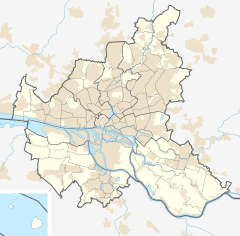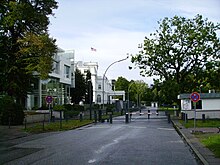
Hamburg, officially the Free and Hanseatic City of Hamburg, is the second-largest city in Germany after Berlin and 6th-largest in the European Union with a population of over 1.9 million. The Hamburg Metropolitan Region has a population of over 5.1 million and is the eighth-largest metropolitan region by GDP in the European Union.

The Alster is a right tributary of the Elbe river in Northern Germany. It has its source near Henstedt-Ulzburg, Schleswig-Holstein, flows somewhat southwards through much of the Free and Hanseatic City of Hamburg and joins the Elbe in central Hamburg.

Außenalster or Outer Alster Lake is the larger one of two artificial lakes, which are formed by the Alster River and are both located within the city limits of Hamburg, Germany. The other „lake“ is the Binnenalster. The Außenalster and its shores are used by the inhabitants of Hamburg for many sport and recreational purposes, such as sailing and rowing.

HafenCity is a quarter in the borough of Hamburg-Mitte, Hamburg, Germany. It is located on the Elbe river island Grasbrook, on the former Port of Hamburg area. It was formally established in 2008 and also includes the historical Speicherstadt area, which since 2015 is an UNESCO World Heritage Site with the adjacent Kontorhausviertel. The main landmark of the HafenCity is the Elbphilharmonie concert hall.

Rotherbaum is a quarter of Eimsbüttel, a borough of Hamburg, Germany. In 2020, the population was 17,114.

Winterhude is a quarter in the ward Hamburg-Nord of Hamburg, Germany. As of 2020 the population was 56,382.
The number of elections in Hamburg varies. Hamburg has a state election every five years, the elections for the state parliament. There are also elections to the federal diet of Germany, the local elections of the diet of the boroughs (Bezirksversammlungen) and every five years to the European Parliament. All elections take place by universal adult suffrage and are regulated by law.
The Constitution of the Free and Hanseatic city of Hamburg is the basic governing document of the German city-state of Hamburg. It was approved on 6 June 1952. It is the fourth constitution that the state has had, consists of 76 articles, and has been amended 34 times.

Dorothee Stapelfeldt is a German politician of the Social Democratic Party of Germany (SPD) who served in the governments of mayors Olaf Scholz and Peter Tschentscher of Hamburg, including as State Minister for Urban Development and Environment (2015–2022) and State Minister of Science and Research (2011–2015).

Eppendorf is one of thirteen quarters in the Hamburg-Nord borough of Hamburg, Germany, and lies north of the Außenalster. In 2023 the population was 25,253.

Osterbek is a river of Hamburg, Germany. The Osterbek has its source at Farmsen-Berne in the Hamburg borough of Wandsbek. After crossing into the borough of Hamburg-Nord, the Osterbek becomes navigable as Osterbekkanal. It joins the Alster at Außenalster, between the districts Winterhude and Uhlenhorst.
The following is a timeline of the history of the city of Hamburg, Germany.

The Consular Agency of the United States in Bremen, also referred to as Consular Agency Bremen, was one of the American diplomatic missions to Germany until 2018. The unit offered limited services for U.S. citizens in areas including Bremen, Hamburg, Schleswig-Holstein, and Lower Saxony. Despite that, services such as the issuing of visas or emergency passports were not provided, but can be obtained only from the U.S. Embassy in Berlin, the Consulate General in Frankfurt or Munich.

Neustadt is one of the inner-city districts of the Free and Hanseatic City of Hamburg, Germany.
The Bach Prize of the Free and Hanseatic City of Hamburg has been awarded since 1951, since 1975 every four years. On the occasion of the 200th anniversary of the death of Johann Sebastian Bach, the prize was founded in 1950 by the Senate and the Hamburg Parliament. The prize is endowed with €10,000 and is awarded to composers, whose works would meet the demands of Bach. €5,000 are earmarked for scholarships.
Alexander-Martin Sardina is a former member of parliament for the Christian Democratic Union of Germany (CDU).
The Hamburg Foundation Asia Bridge (HSAB) is a foundation set up by the Hamburg Senate and the Hamburg Parliament to promote development cooperation in Asia while working with businesses and institutions in Hamburg. It was founded in 2005 and is a charitable foundation under civil law with legal capacity. Hamburg's Senate and Parliament subsidize the foundation annually.














